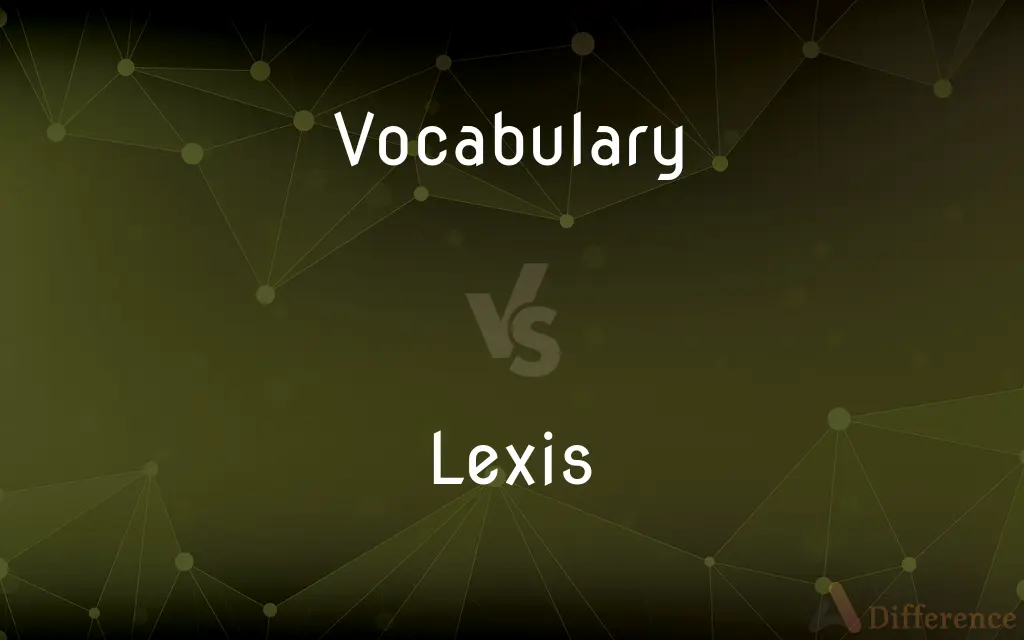Vocabulary vs. Lexis — What's the Difference?
By Maham Liaqat & Fiza Rafique — Updated on February 27, 2024
Vocabulary refers to the set of words known and used by a person or within a language, emphasizing knowledge and usage, while lexis is a linguistic term for the total stock of words in a language, focusing on the system and structure.

Difference Between Vocabulary and Lexis
Table of Contents
ADVERTISEMENT
Key Differences
Vocabulary is often discussed in the context of learning and teaching languages, highlighting the importance of word acquisition and application in communication. It is a measure of a person's language proficiency or the richness of a language. Lexis, on the other hand, is a broader term used in linguistics to refer to all the words in a language, including their forms and variations, without emphasizing their use or knowledge by speakers.
Vocabulary is typically used to assess language development and proficiency, lexis is analyzed for linguistic research, studying patterns, and the organization of words within a language. Vocabulary growth is a personal or educational goal, focusing on the expansion of usable words. Lexis encompasses a comprehensive collection of words, analyzed for understanding language structure and evolution.
Vocabulary is subjective and varies from individual to individual, depending on factors like education, interests, and environment. Lexis is an objective inventory of a language, independent of individual language users, providing a foundation for linguistic analysis and dictionary compilation.
The study of vocabulary is crucial for language learning and teaching, focusing on effective communication and comprehension skills. Lexis contributes to theoretical and applied linguistics, offering insights into language processing, word formation, and semantic networks.
Comparison Chart
Focus
Knowledge and use by individuals
Total stock of words in a language
ADVERTISEMENT
Context
Language learning and teaching
Linguistic research and analysis
Goal
Expansion of usable words
Understanding language structure
Subjectivity
Varies among individuals
Objective inventory of a language
Application
Communication and language proficiency
Linguistic theory, dictionary compilation
Compare with Definitions
Vocabulary
Language Proficiency.
Her extensive vocabulary is evidence of her language proficiency.
Lexis
Linguistic Inventory.
The lexis of English includes a vast array of borrowed words from other languages.
Vocabulary
Subjective Knowledge.
An individual's vocabulary reflects their unique experiences and education.
Lexis
Objective Analysis.
Lexical studies provide objective insights into language usage and evolution.
Vocabulary
Communication Tool.
A rich vocabulary improves both written and spoken communication.
Lexis
Dictionary Basis.
Dictionaries are compiled based on the comprehensive lexis of a language.
Vocabulary
Personal Development.
Expanding your vocabulary can enhance your ability to express complex ideas.
Lexis
Language Structure.
Lexis analysis helps in mapping out the structure and changes in a language over time.
Vocabulary
Word Acquisition.
Vocabulary building is a key aspect of language learning.
Lexis
Word Patterns.
Linguists study the lexis to understand word formation patterns.
Vocabulary
A vocabulary is a set of familiar words within a person's language. A vocabulary, usually developed with age, serves as a useful and fundamental tool for communication and acquiring knowledge.
Lexis
The total set of words in a language as distinct from morphology; vocabulary.
Vocabulary
All the words of a language.
Lexis
(linguistics) The set of all words and phrases in a language; any unified subset of words from a particular language.
Vocabulary
The sum of words used by, understood by, or at the command of a particular person or group.
Lexis
Words, collocations, and common phrases in a language; vocabulary and word combinations.
Vocabulary
A list of words and often phrases, usually arranged alphabetically and defined or translated; a lexicon or glossary.
Lexis
The vocabulary used by a writer
In this broadsheet newspaper, the reporter uses a complicated and formal lexis which I find hard to understand.
Vocabulary
A usually alphabetized and explained collection of words e.g. of a particular field, or prepared for a specific purpose, often for learning.
Lexis
All of the words in a language; all word forms having meaning or grammatical function
Vocabulary
The collection of words a person knows and uses.
My Russian vocabulary is very limited.
Vocabulary
The stock of words used in a particular field.
The vocabulary of social sciences is often incomprehensible to ordinary people.
Vocabulary
The words of a language collectively; lexis.
The vocabulary of any language is influenced by contacts with other cultures.
Vocabulary
A list or collection of words arranged in alphabetical order and explained; a dictionary or lexicon, either of a whole language, a single work or author, a branch of science, or the like; a word-book.
Vocabulary
A listing of the words used in some enterprise
Vocabulary
A language user's knowledge of words
Common Curiosities
What is the main difference between vocabulary and lexis?
The main difference is that vocabulary emphasizes the words known and used by a person, while lexis refers to the total stock of words in a language.
Why is vocabulary important in language learning?
Vocabulary is crucial for effective communication, understanding, and language proficiency.
Can a person's vocabulary include words not actively used?
Yes, a person's vocabulary can include passive knowledge of words not regularly used in speech or writing.
Is vocabulary static or dynamic?
Vocabulary is dynamic, constantly evolving with language use, learning, and exposure to new contexts.
What factors influence an individual's vocabulary size?
Factors include education, reading habits, interests, and social environment.
How is lexis organized in linguistic studies?
Lexis is organized based on morphological, syntactical, and semantic criteria in linguistic studies.
What role does lexis play in dictionary compilation?
Lexis serves as the foundational inventory from which dictionaries are compiled, including definitions and usage examples.
How does lexis contribute to linguistic research?
Lexis provides the basis for analyzing language structure, word formation, and semantic networks.
What is a lexical item?
A lexical item is a single word, part of a word, or a chain of words that forms the basic elements of a language's lexicon.
Does lexis include slang and technical terms?
Yes, lexis encompasses all words, including slang, jargon, and technical terms, reflecting the language's full scope.
Can vocabulary size predict language proficiency?
While not the only factor, a larger vocabulary is often a strong indicator of higher language proficiency.
What is lexical diversity?
Lexical diversity refers to the range and variety of words used in a language or by an individual, indicating richness and complexity.
How does culture influence vocabulary and lexis?
Culture shapes vocabulary and lexis through the introduction of new words and expressions that reflect societal changes and innovations.
How can one expand their vocabulary effectively?
Expanding vocabulary can be achieved through reading, language study, practice, and exposure to new linguistic contexts.
How do vocabulary and lexis relate to semantics?
Both vocabulary and lexis are integral to semantics, as they include the study of meanings and the relationships between words.
Share Your Discovery

Previous Comparison
Interview vs. Inquiry
Next Comparison
Save vs. RescueAuthor Spotlight
Written by
Maham LiaqatCo-written by
Fiza RafiqueFiza Rafique is a skilled content writer at AskDifference.com, where she meticulously refines and enhances written pieces. Drawing from her vast editorial expertise, Fiza ensures clarity, accuracy, and precision in every article. Passionate about language, she continually seeks to elevate the quality of content for readers worldwide.















































